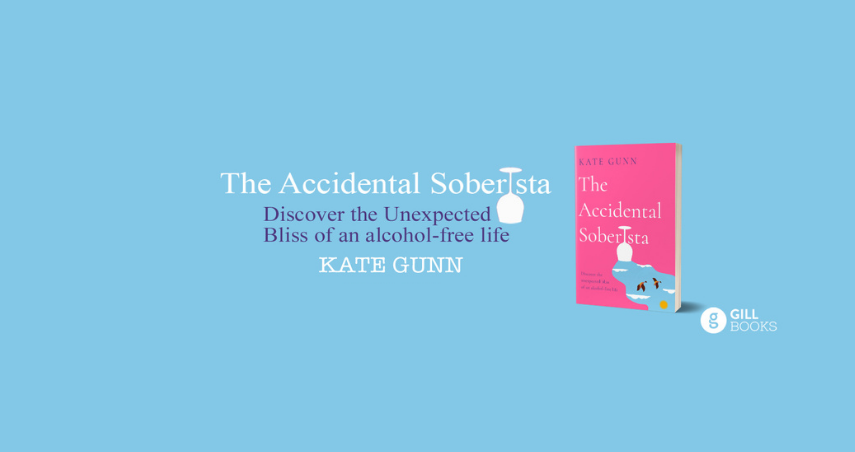3 minute read.
We were delighted to get a chance to speak with Irish blogger and author of “The Accidental Soberista” Kate Gunn last week over Zoom. “The book details my drinking career, how I got sober curious, and how giving up changed my mind, body, friendships, socialising, parenting and every other aspect of life – for the better” says Kate in her blog.
Joining our chat with Kate was behavioural specialist Padraig Walsh and Sarah Connolly from The Virgin Mary Bar.
We started off by asking Kate: Did you ever think this 30-day challenge would be for life?
“Not in a million years did I think it would be a permanent decision. I never saw myself being a non-drinker!”. Kate discussed how she was in a sort of middle bracket of drinking – “I was fine with the way my drinking habits were”.
Padraig commented on what he thought of setting challenges. “They’re useful in terms of setting a goal”. Padraig added that “people need to feel comfortable with a challenge” if they really want to stick to it. “Focus on self-compassion – introducing embarrassingly small challenges that are guaranteed to give you behavioural momentum will work out a lot better than trying to stick to a stretch goal”.
Reactions to being a non-drinker
Kate says that being a non-drinker was sort of awkward and uncomfortable for the people around her… “My sisters were comfortable saying it to my face. People get annoyed when you disturb the status-quo.”
This begs the question “Why do you think people get so uncomfortable?”. Padraig explained that “When someone is not following social norms, we tend to view them with suspicion and unease. We are the only animals on earth with an enhanced survival mode that actually requires us to be social in order to live.”
Padraig then considered how fundamental other people’s reactions are in our lives. “We need to know the answer to the question ‘How do I know if I’m doing well’? We look around us to see what others are doing and then look at our own lives. Our self-image is based on feedback, and how our peer group responds to our lifestyle essentially frames us in a way”.
Kate says she was “Unsure of herself at the start”, but she gained confidence in her decision as time went on.
The Virgin Mary Bar
Sarah described what it’s like to drink in The Virgin Mary Bar, a non-alcohol bar in Dublin City Centre. “There’s no negativity, the stigma of being a non-drinker is completely removed. Nobody is questioning why people aren’t drinking!”. Sarah added that it’s a great place to ease yourself into the alcohol-free world before trying it on your usual night out; “Coming here is a lot less daunting if you want to try an alcohol-free night out, instead of going to your usual place.”
Since Kate has removed alcohol from her life, she spoke to us about how social events have been for her. “It’s been absolutely fine, especially since lockdown.” Kate went on to say that she has always been an ‘introverted person’. You get the exact same social interactions from social outings as a non-drinker, but without the negative effects it has on you the morning after!”
The importance of replacement
We all discussed how important it is to have a replacement for alcohol if one wants to take alcohol off the shopping list for a while. Padraig explained “we’re often mulling and resenting our decision if we do not replace our choice not, to do something.” Having a replacement – such as an alcohol-free drink, or an activity that can take up the drinking slot, something that gives you a similar feeling is essential if you want to sustain the choice not to drink. Padraig says that we can’t leave a hole in our routine where alcohol once was.
Kate shared with us the unexpected benefits she encountered after deciding not to drink alcohol. “I would have planned my Friday but would have put nothing on the calendar for Saturday, to have that day saved for the hangover. Time for planning, energy for doing.”
Drinkaware CEO Sheena spoke about the media representation of drinkers – “It’s often always about the problem drinkers or the non-drinkers, but never about the middle drinkers, which can actually be quite problematic sometimes, or not problematic at all”.
Alcohol Alternatives
Sarah mentioned some alcohol alternatives, and with that she shared with us some no/low alcohol beverages she has enjoyed recently.
“People have been very interested in sparkling wine, Bubbles with Benefits (0.5%). No-alcohol Lagers and ales are also increasingly popular, I’ve seen those doing very well!”
Keep an eye out for our upcoming guest blogs from Kate Gunn in the coming weeks.
You can read up on alcohol alternatives or explore mindful drinking and read our tips to drink less alcohol.
Make sure to check out ‘The Accidental Soberista’ by Kate Gunn in your local bookstore.


